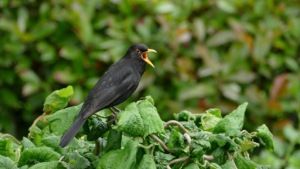News
News in Digest: Blackbird fly … blackbird fly!
This article is more than 7 years old.
Mosquitos stinging in the dead of night

All your life you were dreading that this moment might arise (photo: Pixabay)
Rather like the human population, animals often have good reasons for leaving Denmark. Some have no choice (eaten by seals/struck down by a virus), some visit on holiday (the odd cheeky dolphin) and others decide they just can’t hack it.
Beware of the birds
A deadly mosquito-borne virus has been wreaking havoc with the blackbird population in northern Europe. This year in Germany alone 25,000 birds have succumbed to it, and now the usutu virus has reached the Danish border.
The public have been warned to be wary of sluggish birds, as the virus could be passed on to humans. Experts say a cold summer will save the birds, as mosquitos thrive best between May and September.
Lone wolf syndrome
The wolf population in Denmark has shrunk over the past year, according to the Danish Centre for Environment and Energy, to the extent there are only five wolves left in Denmark – down from a peak of nine last year.
One of the wolves was shot by a farmer in a high-profile case, another was hit by a car in Germany, while two others have emigrated to northern Germany.
It would appear they prefer Greenland, where a study has confirmed that the island does indeed have its own wolf species, albeit in a limited supply.
Defeats the porpoise?
The same was true of the grey seal in Denmark, but in 1967 it became a protected species due to over-hunting and it has since made a startling comeback in Danish waters, which is bad news for porpoises.
Grey seals, which can grow to a size of 300 kilos, aren’t fussy eaters – they’re even known to eat harbour seals. And now they’re increasingly killing porpoises, as they tend to yield a much higher amount of food than a bunch of fish.
The government has recently permitted the hunting of some of the seals again – particularly because they rip open fishing nets to eat the trapped fish inside.
Doggone it!
Also growing in number is the raccoon dog, which environmentalists believe have crossed from Jutland to Funen – most probably by swimming.
Originating in eastern Asia, the dogs easily out-compete native predators like foxes and badgers. They can also carry rabies and are prolific breeders, and Miljøstyrelsen estimates there are over 3,000 in Jutland.
Beavering (go) away
Slightly more welcome is the return of the beaver. Hunted out of Denmark a thousand years ago, 18 beavers were released into the wilds of Jutland in 1999, and there are now over 200.
However, their habit of gnawing down trees and damming up streams has caused the flooding of forest, pastoral and residential areas, and some are calling for a cull of the protected species.
Dolphin’s rare visit
Finally, just over for a quick visit recently in the Limfjord near Aalborg was a short-beaked common dolphin – the first time one has been spotted that far north.
The species is common around the British Isles and is often seen in the North Sea. Biologists speculate that climate change has altered the dolphins’ range and that they may become permanent guests around Denmark. (CPH POST)










































